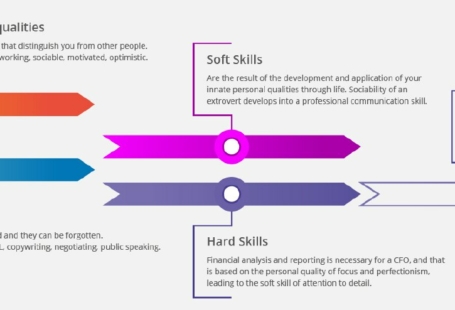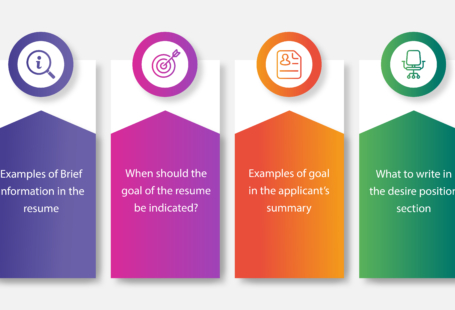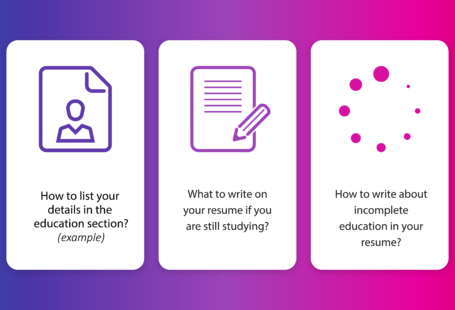It only takes a few well chosen words on the personal qualities section to enhance your resume. Employers are always looking for motivated, honest, reliable, and flexible professionals to help their company grow and prosper. Putting your strengths at the top of your resume increases your chance of getting a job. But, personal qualities for a job and soft skills are not the same thing, and many candidates confuse personality traits and professional skills.
In this article you will learn:
- What is the difference between qualities and skills in a resume?
- What are the personal qualities in a resume?
- How to write about personal qualities in a resume?
- Positive personal qualities in resume examples
- What to write about negative qualities in the resume?
What are non personal qualities?
Before writing about good traits to put on a resume, let’s find out all the subtleties.
According to Wikipedia, NON personal qualities are:
Unusual, surprising — this is a subjective perception.
Dexterity, beauty — the physical qualities of a person.
Reliable — a social assessment of personality.
Experienced, wise — a temporary, unstable state of a person.
Personal qualities are formed by…
- specific genetic predisposition
- a set of innate traits that determine life attitudes
- education
So, the personal qualities of a person are the properties of human nature, for example patience, friendliness, and honesty.
Why should you write about personal qualities for a job?
It’s simple. You increase your chances of success. For example, if you cannot handle people that don’t have a sense of humor, you won’t be able to work productively with them. If you consider a window of 10-minutes being late and not that big of a deal, then a punctual person will just be irritated. Personal qualities are just as important as professional skills, but acquiring them is much more difficult because they are formed throughout one’s life and under the influence of many different circumstances.
What is the difference between qualities and skills?
When a section on personal qualities in a resume is required by the employer, the applicant may write, for example: «I am attentive to details»; or, «I’m good at public speaking». But this is a mistake, because in this case the applicant is highlighting his or her professional skills.
Qualities are not the same as skills, instead they form skills.
For example, if you have perfectionism as a personal quality, you will naturally form the skill of attention to detail. And if you are an extrovert, it’s easier for you to develop the skill of public speaking. Moreover, a sociable person gains the skill of working in a team quicker than his introverted colleague.
Personal qualities are necessary for the quick and effective assimilation of professional skills.
Tip: personal qualities and achievements in a resume go hand in hand, but don’t write about your doubts in one word; try to give an example of how personal quality has turned into a skill and helped you in your career.
Good qualities for a resume
How to describe personal qualities on a resume? Below is a list of skills and qualities and examples of personal attributes.
Adventurous — I can take risks
Ambitious — I strive to succeed
Plain — I work well with others
Eloquent — I express myself well in front of groups
Independent — I take the initiative
Calm — I remain balanced in crisis
Charismatic — I can be a leader when it is necessary
Cheerful — I create a positive work environment
Self-assured — I’m not afraid to ask questions
Cooperative — I work well as a part of team
Polite — I care about the atmosphere in the workplace
Creative — I think outside the box
Resolute — I’m motivated
Devotee – I am committed to the success of the company
Diligent – I always work my best
Flexible – I quickly adapt to new situations
Educated – I have special knowledge
Effective – my work is moving very fast
Eloquent – I have strong communication skills
Vigorous – I can work long and hard
Concentrated – I’m goal-oriented person
Friendly – it’s easy to work with me
Honest – I appreciate honesty
Creativity – I am inventive in the workflow
Independent – I need a little direction
Curious – I collect information perfectly
Insightful – I can read between the lines
Perfectionist – I pay attention to small details
Patient – I’m not annoying
Shrewd – I can read people effortlessly
Convincing – I can sell
Procedural – I work best with structure
Punctual – I have excellent time management skills
Terse – I’m a great listener
Resourceful – I use every tool at hand
Responsible – I always complete the task on time
Talkative – It’s easy for me to start a dialogue
Innovative – I constantly look for new and better ways to do things
See also: Professional skills resume + examples
The best personal qualities in resume examples
Brian Tracy is a well-known entrepreneur, opinion leader, business coach, and writer. He talks about how to find your dreams, fill them with passion, and discover your true potential, which ultimately leads to a new and more successful life.
In this video, he voices those basic personal qualities that make it possible to move to the next, higher levels of achievement.
What personal qualities and resume attributes should be added?
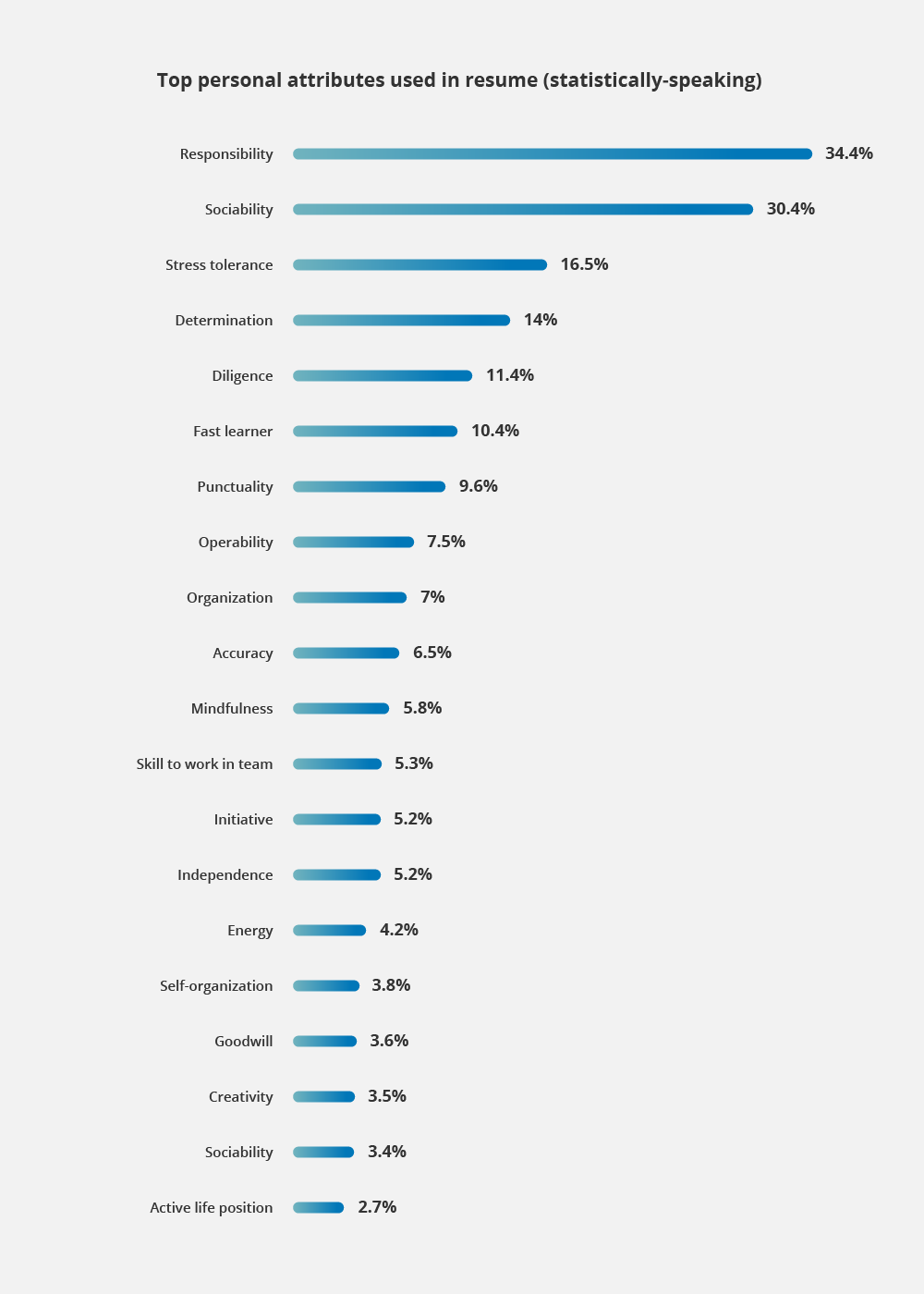
Here is also our a list of positive personal qualities to be user when writing your resume
- Accurate
- Learns Quickly (Quick Study, Quick Learner)
- Highly Dependable
- Highly Productive
- Conscientious
- Resilient
- Self-Starter
- Trustworthy
- Action-Oriented
- Detail-Oriented
- Quality-Oriented (Quality-Focused)
- Customer-Focused
- Improvement-Oriented
- Goal-Oriented
- Thorough
- Responsive
- Committed/Dedicated
- Industrious
- Decisive
- Energetic
- Spirited
- Articulate
Tip: first create a set of characteristics for a resume that best suit your profession, and write those which applicable to you in your resume.
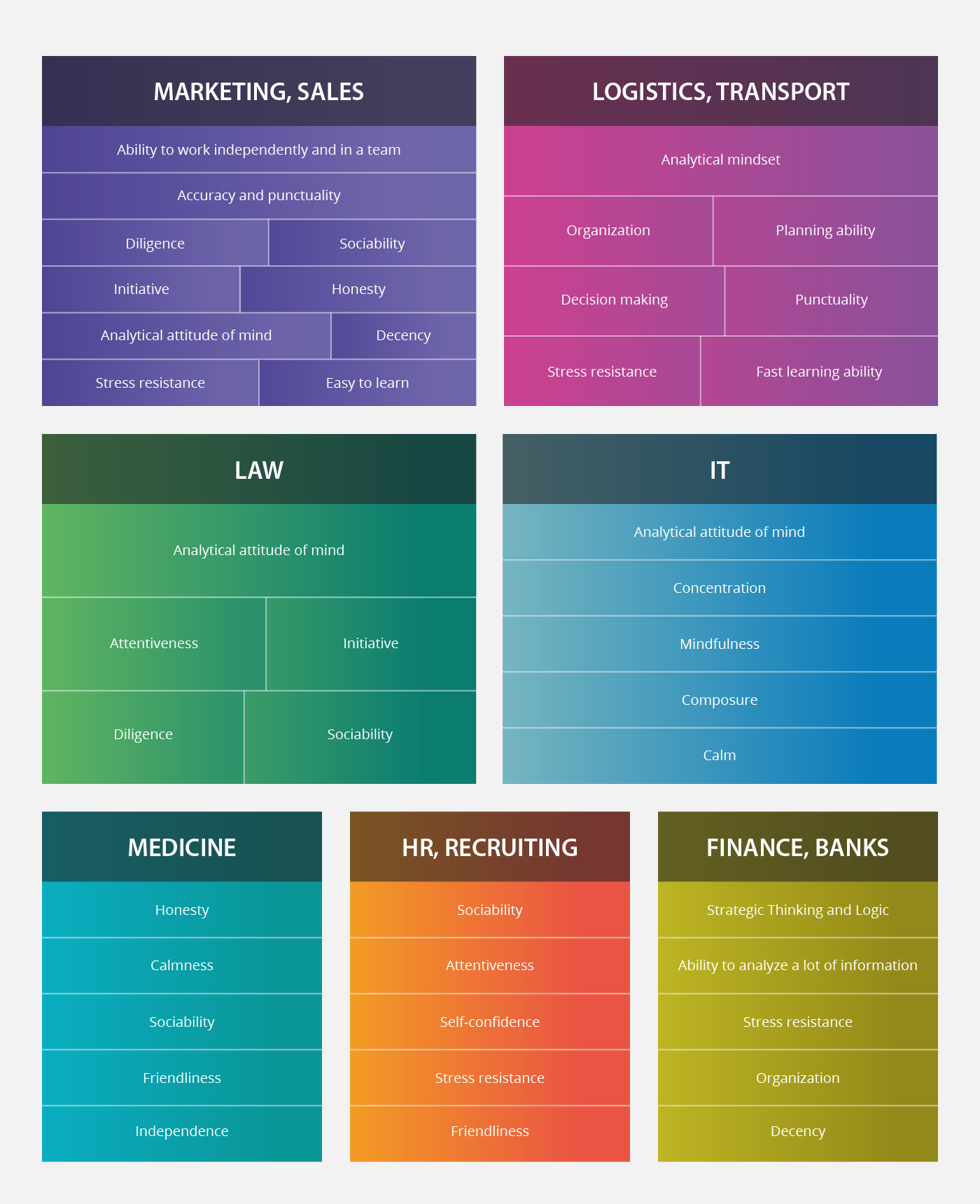
Common mistakes made when making a resume
It’s a given that in this ever-growing, globalized workforce that there are bound to be tons of mistakes popping up on resumes. If you’re a non-native English speaker (and even sometimes native speakers!) the top mistakes involve – spelling, grammar, misuse of words, punctuation, and an overall incorrect way of conveying a message to your prospective employer that you are indeed competent and can get the job done.
As a professional applying for a job, make sure you know which country your employer is from and which form of English is used. For example, if you’re in Australia or the UK, you’re going to spell words using «s» instead of «z», as you would in the US (i.e., specialise, vs. specialize). Spelling words based on the country of employment is crucial and shows you have an understanding of the «correct» use of English.
Grammar is crucial. If you cannot use it properly then it looks poorly and reflects a lack of attention to detail on your end. Double-check that you know the difference between «they’re», «there», and «their». You never know how particular your employer may be and how badly mistakes irk them. Overall, there can be worse mistakes on a resume, but paying special attention to how specific British versus American English is used can make a difference in how employers view you.
Examples of negative qualities to put on a resume
Many people ask themselves: is it necessary to list their shortcomings in a resume? If the employer does not require you to dwell on negative qualities, then do not write anything.
If your future boss decided to include «character weaknesses» in the CV column, this should not be ignored.
First, let’s see why he wants to know about your shortcomings?
The boss is interested in the following issues:
- Do you perceive yourself adequately?
- Are you able to listen to the opinions of others?
- Will you respect authority?
Weaknesses are one of those points where being elusive is useless. Do not be too zealous in listing your shortcomings, though. And blaming yourself for your weaknesses is not necessary. Describe the negative side of your personality, which cannot adversely affect the desired position. Make sure the negative traits aren’t considered a disadvantage in the area you’re applying for.
Deficiencies in your resume should be a mirror image of your strengths.
For example, a description of personal qualities in a resume for a sales manager may sound like this: haste, anxiety, and distrust.
Here are a few personal qualities that you can safely present to your employer as a negative:
- straightforwardness, intolerance, inability to lie;
- pedantry, selfishness, lack of sociability;
- emotionality / emotionless, single-tasking.
Remember that for one profession it is good, in another it is unacceptable. For example, for a non-communicative accountant, this is useful when working, but wouldn’t be for a salesperson.
It is also important to understand that negative qualities are often the flip side of strengths and skills.
For example, if a person is focused and detail-oriented — it is not shameful to be unproductive and uncommunicative. A sociable extrovert is allowed to be a bit hasty and somewhat superficial. If you take a different approach in how you portray seemingly negative characteristics and instead match them with positive roles, you’re sure to come out on top.
Tip: Find 2-3 personal qualities that are considered a flaw in everyday life, but from the point of view of your chosen profession turn them into virtues.
When presenting your negative qualities, be sure to clarify that you are actively struggling with them. This gives the employer the impression that you aren’t complacent.
For example, if you are talking about shyness or impulsiveness you can describe how they’ve come about, and add that you are working on improving: you’re attempting to be more sociable and are trying to control your enthusiasm.
Let’s briefly consider a simple example where the weaknesses of the applicant went into the plus column from a professional point of view:
credulity – you will be perceived as a person who is able to conclude contracts only with reliable partners;
self-confidence – you will be seen as a leader who strives for progress;
hyperactivity – they will bet on the speed of tasks that are disproportionate to other employees;
slowness – the recruiter is looking for a meticulous employee who can catch mistakes and not miss important nuances;
increased anxiety – a responsible approach to work and responsibilities;
exactingness – if the employee demands from himself, then he will treat the production process with equal responsibility;
thoroughness – the ability to follow through with initiatives through numerous checks;
modesty – credited when searching for employees who weigh before speaking, help prevent conflicts and misunderstandings.
An example of the accountant’s weaknesses:
- suspicion;
- excessive pedantry;
- increased anxiety;
- straightforwardness;
- thoroughness;
- modesty;
- inability to lie;
inability to negotiate.
But for specialties that require direct communication with a wide audience, this list of qualities is not suitable.
What disadvantages can a manager have?
- anxiety;
- hyperactivity;
- exactingness;
- stubbornness;
- confidence;
- straightforwardness;
- impulsiveness.
As a final thoughts
All in all, landing a job relies on your best personal qualities showcased on your resume
People these days are used to expressing themselves. They post photos on Facebook, write personal thoughts on their blog, and share work stories on LinkedIn. And yet, it is very difficult for many people to talk about themselves during an interview. It’s like they’re a deer caught in the headlights.
On the first date, you can call yourself «carefree» and «compassionate», but during an interview, these words simply do not exist. That is why it is important to truthfully share your personal qualities, turning them into skills that can be applied to work.
Strengths on a resume are as important as your salary at work.


